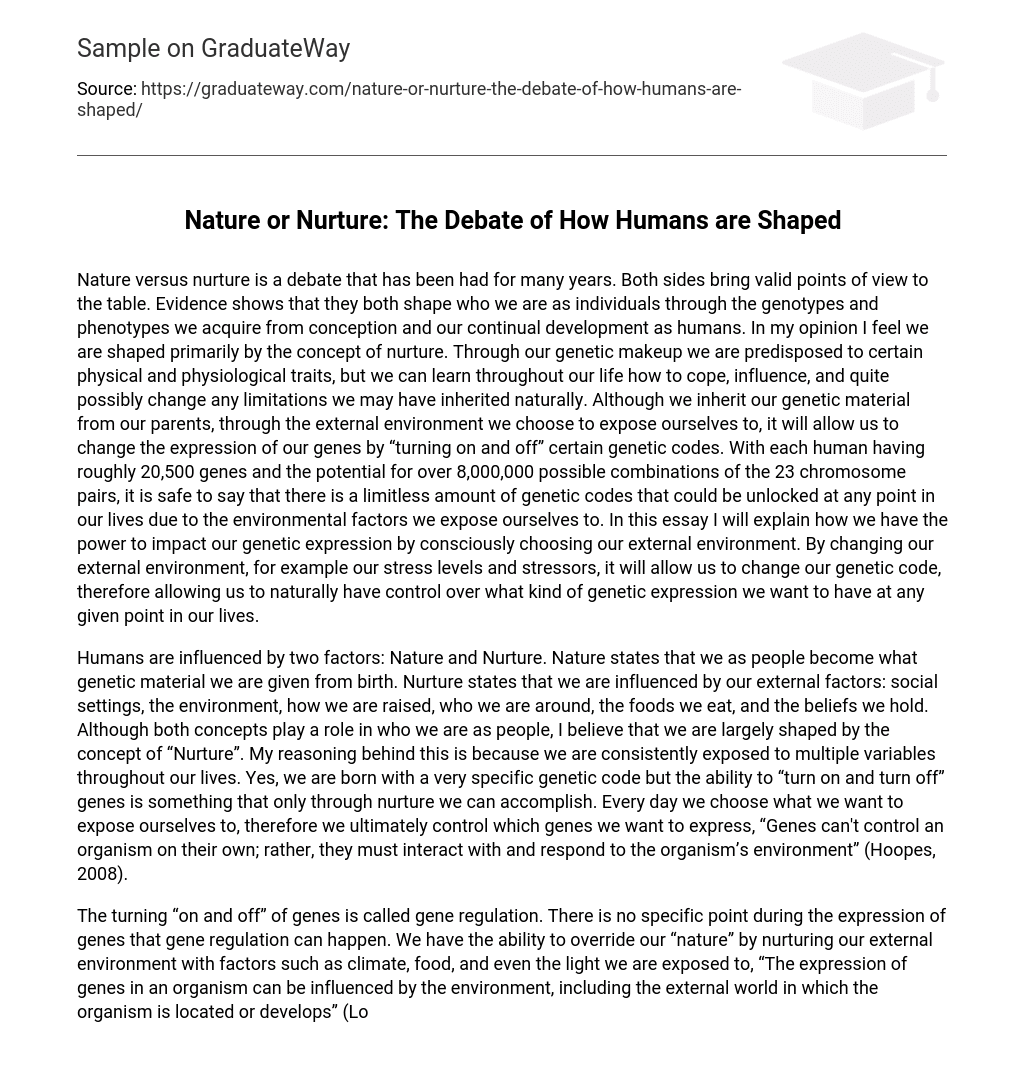Nature versus nurture is a debate that has been had for many years. Both sides bring valid points of view to the table. Evidence shows that they both shape who we are as individuals through the genotypes and phenotypes we acquire from conception and our continual development as humans. In my opinion I feel we are shaped primarily by the concept of nurture. Through our genetic makeup we are predisposed to certain physical and physiological traits, but we can learn throughout our life how to cope, influence, and quite possibly change any limitations we may have inherited naturally. Although we inherit our genetic material from our parents, through the external environment we choose to expose ourselves to, it will allow us to change the expression of our genes by “turning on and off” certain genetic codes. With each human having roughly 20,500 genes and the potential for over 8,000,000 possible combinations of the 23 chromosome pairs, it is safe to say that there is a limitless amount of genetic codes that could be unlocked at any point in our lives due to the environmental factors we expose ourselves to. In this essay I will explain how we have the power to impact our genetic expression by consciously choosing our external environment. By changing our external environment, for example our stress levels and stressors, it will allow us to change our genetic code, therefore allowing us to naturally have control over what kind of genetic expression we want to have at any given point in our lives.
Humans are influenced by two factors: Nature and Nurture. Nature states that we as people become what genetic material we are given from birth. Nurture states that we are influenced by our external factors: social settings, the environment, how we are raised, who we are around, the foods we eat, and the beliefs we hold. Although both concepts play a role in who we are as people, I believe that we are largely shaped by the concept of “Nurture”. My reasoning behind this is because we are consistently exposed to multiple variables throughout our lives. Yes, we are born with a very specific genetic code but the ability to “turn on and turn off” genes is something that only through nurture we can accomplish. Every day we choose what we want to expose ourselves to, therefore we ultimately control which genes we want to express, “Genes can’t control an organism on their own; rather, they must interact with and respond to the organism’s environment” (Hoopes, 2008).
The turning “on and off” of genes is called gene regulation. There is no specific point during the expression of genes that gene regulation can happen. We have the ability to override our “nature” by nurturing our external environment with factors such as climate, food, and even the light we are exposed to, “The expression of genes in an organism can be influenced by the environment, including the external world in which the organism is located or develops” (Lobo, 2008). What we eat can directly influence our internal environment such as our metabolism and ultimately the genetic material we pass on to future generations. The foods that are produced in today’s society are chemically laden and full of sugars. The toxins we consume in our food combined with the abnormally large amounts of sugar cause our insulin to spike and ultimately can lead to condition such as heart disease, COPD, high body fat percentage as well as a plethora of other health conditions. These foods can directly impact our genotype. Environmental factors such as food, drugs, or exposure to toxins can cause epigenetic changes by altering the way molecules bind to DNA or changing the structure of proteins that DNA wraps around. These structural changes can result in slight changes in gene activity; they also can produce more dramatic changes by switching genes on when they should be off or vice versa (Duke Magazine, 2012).
So, by choosing to surround your environment with healthier foods you are able to “turn off” the genetic makeup for disease, just like you would be able to “turn on” those same genes, thus resulting in the genotypical change. Another example for nurture being the dominant case for developing ourselves as human is the external factor of stress levels. Stress plays a large role in the kinds of hormones that gets released into the bloodstream. Our gender also plays a large role in deciding the levels of specific hormones in the body. Males tend to have higher levels of testosterone and lower levels of estrogen, vice versa for women. “The baldness allele, which causes hair loss, is influenced by the hormones testosterone and dihydrotestosterone, but only when levels of the two hormones are high. High levels of stress can lead to expression of the gene in women. In stressful situations, women’s adrenal glands can produce testosterone and convert it into dihydrotestosterone, which can result in hair loss” (Lobo, 2008). So, by decreasing the environmental causes of stress you can decrease the internal hormone production that would cause balding. Therefore, by reducing the levels of stress in your environment, you will be changing the phenotype of baldness
As you can see, even though we have a pre-selected genotype when we are conceived, we are able to directly influence the genetic expressions we want to have by nurturing the proper environment. Our genotype and phenotype are simply roadmaps that have an endless number of roads we can choose to drive down. By choosing what kind of environment we want to place ourselves in, we can choose to nurture and foster the exact kinds of individuals we want to be. Nature and Nurture are both vital for our development because naturally we have a set number of genes, but we ultimately have the ability to nurture what type of phenotypes we want to express within our genotype.





